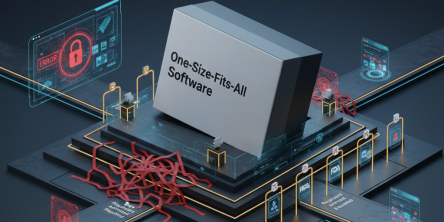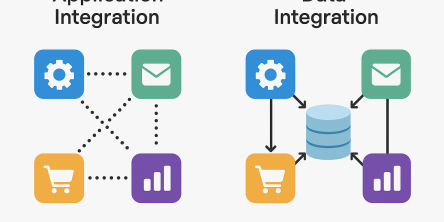Enterprise Mobile App Development: Should You Build or Buy?

As more and more companies embrace the digital revolution, they are faced with a critical choice: do you build your app, just buy one or modify third-party apps? It is one of the biggest questions enterprises face while preparing for digital transformation initiatives. You would agree the applications are the centerpiece of mobility, whether you need to embark on in-house enterprise mobile application development or purchase already popular apps and customize them as per requirements. The choice is decidedly tough; so we put together a handy guide to help you decide if you should build or buy your enterprise app.
- Control: A key consideration when deciding between building your enterprise app and buying one is the extent of control the company has over the app. Of course, when one builds the app themselves, they have complete control over how it is developed, the features it has, etc. Such control is not an option when you buy an enterprise Mobile app. An uncomplicated way through this conundrum is to analyze how much a commercial app fits the business’ requirements. Unless it is at least a 60 percent match, the better idea would be to just build your Mobile app.
- Security: Every single company wants to ensure top-notch security. To that end, it becomes vital to use an enterprise app that is amply fortified with modern security features and functionalities. Then there is also the fact that employees now increasingly use their own devices for work — a fact that can have major consequences for security. With an off-the-shelf offering, a company may not necessarily get all the security features it wants; with a custom-made app, on the other hand, the security provisions are decided by the company itself.
- After-sales support: One of the most important facets of software is that the cycle does not end at just the acquisition. No matter the options one chooses, after-sales support is critical because it often takes time for the intended users of the software to adapt to it. So, when deciding whether to buy or build, one must pay careful attention to the period for which you will be offered support for the purchased app and also the nature of the support that will be made available to the organization. Being mobile-first is crucial in today’s day and age
- Cost: It is natural for an organization to want to pick the most affordable option. However, such a decision may not always work out in the company’s interests. This is not to say that cost should not be a consideration at all; all we are saying is that companies must not consider just the initial cost, but also other associated costs with each option such as upgrades, fixes for bugs, support, etc.
It is understandable to struggle to decide between building or buying software. After all, there are countless factors to be considered — factors that vary from company to company and sector to sector. Business needs to devise a solution. While this guide seeks to help ease the decision for you, it is still important for companies to take the time to first carefully deliberate their requirements, their expectations, and the precise reasons for why they felt the need for a solution in the first place. Once you have a clear idea about what is driving the need for software, it will become much easier to decide between build or buy. If you still feel the need for expert advice or have already made up your mind about going the build route, you should start looking for an expert custom enterprise mobile application development services provider right away.
Similar Articles
At first glance, off-the-shelf software appears to be a dream come true. They are quick to set up, cheaper upfront, and marketed as “universal.”
A modern business must continually adapt. This bit everyone seems to know.
The modern healthcare industry is undergoing a significant transformation. The models of healthcare that we are used to thus far are now making way for a more data driven approach
In the modern world, maintaining good health often feels like a constant challenge. Between busy lifestyles, sedentary habits, and lack of motivation, many people find it difficult to stay consistent with exercise, diet, or wellness practices.
Every news publisher's dream, or just getting started, hits that wall sooner or later. What do you build your site on? You’ve basically got two roads: WordPress or custom development.
Discover key features construction teams need in permit tracking software to boost efficiency, stay compliant, and streamline project management.
Thanks to cloud computing, specialized SaaS apps have become rather accessible.
Let’s be honest – managing royalties isn’t exactly the fun part of working in media or publishing, but it is very important because it protects the creator’s rights and work ownership.
The Software as a Service (SaaS) industry continues to transform before 2025 which creates new obstacles for business operations.








